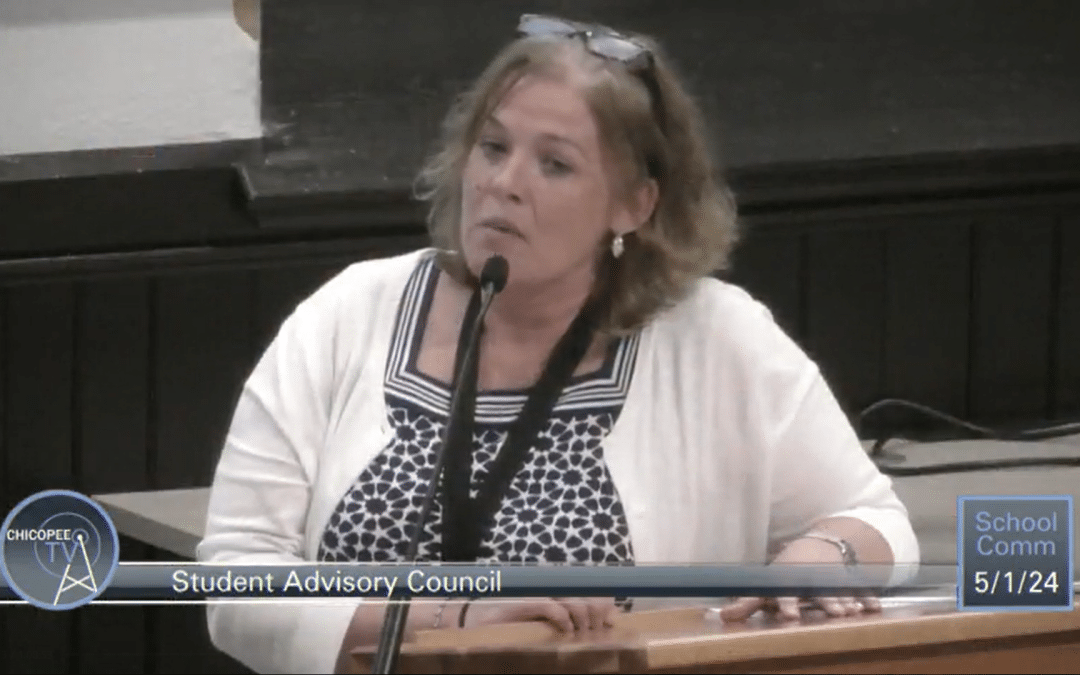Assistant Superintendent Jennifer Bellville gives a MCAS presentation during the May 1 School Committee meeting.
Reminder Publishing screen capture by Tyler Garnet
CHICOPEE — The School Committee learned about the districts MCAS results during its meeting on May 1.
Assistant Superintendent for Instruction and Accountability Jennifer Bellville gave an overview presentation of what the district’s MCAS scores were from last year, highlights, the challenges and some next steps.
Before Bellville presented the scores, she wanted to go over some challenges she saw which included attendance, vertical and horizontal alignment and sub-groups like high needs students.
The enrollment at Chicopee Public Schools has fluctuated and demographics in Chicopee have changed over the past five years.
“Our level of need has changed significantly in the past five years and we have to remember in those five years we also had a pandemic, so there’s been a lot,” Bellville added.
The percent of high needs students in the 2018-19 school year was 60.7%. In the 2023-2024 school year, that number has increased to 72.7%.
That 12% increase is equivalent to 960 students and Bellville added that level of need is really important when the district is looking at its academic achievement.
The presentation also showed that last year, 33.7% of students were considered chronically absent which means they missed 18 days of school or more.
Bellville acknowledged that it is hard to teach students who don’t show up.
“We need to get them in our doors first so that we can address their learning and their learning needs,” she added.
The presentation has shown that from the 2022-2023 school year to this school year, the chronic absenteeism rate has decreased 10% due to different initiatives.
The MCAS scores were compared to those across Massachusetts and started by looking at grades 3-8.
Globally, in third grade to eighth grade, only 29% of Chicopee students are meeting or exceeding expectations.
“That’s an alarming number and we are lower than the stat average,” Bellville added.
For the English portion of MCAS, the presentation broke it down by school for all grade levels.
Last year was the first year for implementation of CKLA K-5 which was a brand new English language arts curriculum.
Bellville said that with implementation, there may be an academic dip but show some schools make progress.
Writing in grades 6-8 was a weakness, but Bellville explained that has been a focus area of Edward Bellamy Middle School Principal William Holt and Kevin A. Dupont Memorial Middle School Principal Jonathan Endelos.
For grade 10, MCAS is a graduation requirement but Bellville said, “We do provide an opportunity for our students who do not meet in grades 11 and 12 to retake the MCAS, as well as to have an education proficiency plan. We do everything we can to make sure they meet this requirement for the state so they are able to receive their diploma.”
For mathematics, next year the district is due for a Kindergarten to fifth grade math review to look at a few programs.
Only 26% of students are meeting or meeting expectations against state standards but in grades 6-12, there was a new math curriculum and a focus on professional development and math practice standards.
Bellville said that Chicopee Public Schools is still looking at different curriculum to implement to work with students.
She said, “One thing we do need to point out is the time on academics especially in the lower levels around science. In our younger grades we spend a lot more time on English and mathematics. We are looking at time on academics across the board to make sure that they’re equitable in all of our schools.”
Highlights from last year’s MCAS included eight schools made substantial progress towards targets, four schools made moderate progress towards targets and only one school made significant progress.
“I know that data is not where any of us want it to be as far as our students meeting or exceeding state standards, we’re making progress. There was movement,” Bellville said.
Looking forward, Bellville said the schools will continue to work on attendance, special education program structures, new curriculum in certain grade levels, continued work with statewide systems of support and professional development.


